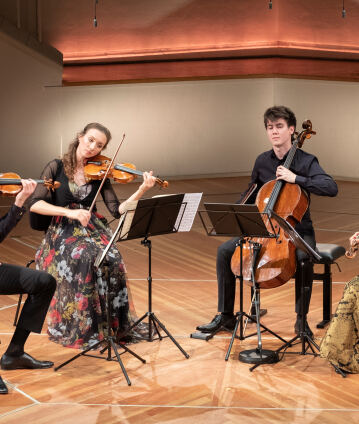Philharmonic String Quartet: Music of remembrance

As a female composer in the 19th century, Fanny Hensel could not hope for acclaim. Yet her E-flat major quartet impressively demonstrates her extraordinary talent. It is played here by the Philharmonic String Quartet, a young generation of the Berliner Philharmoniker, together with her brother Felix Mendelssohn’s Sixth Quartet in which he commemorated his beloved sister Fanny Hensel who died at an early age. A sense of mourning also characterises the works of Puccini and Barber.
The belief that Fanny Hensel was influenced by her brother Felix Mendelssohn is only half the truth. The siblings studied with the same teachers, communicated intensively about their work and consequently undoubtedly influenced each other. However, given the social conventions, Felix also advised his sister against a career as a composer. Her only string quartet shows a self-assured and original tonal language. Canon and fugue passages demonstrate the composer’s thorough technical training. The work does not begin, as usual, with a fast movement, but with an idiosyncratically designed and motivically dense slow movement.
After Felix learned of Fanny’s death in May 1847, he said: “I still cannot think of work, indeed of music at all, without feeling the greatest emptiness and desert in my mind and heart.” The String Quartet in F minor is the last work the composer was able to complete before his own death just six months later. While the fast movements are characterised by turbulence and drama, the slow movement is gentle and full of anguish.
The expression of grief, which can have a peculiarly consoling effect in music, also characterises the two short quartet movements by Giacomo Puccini and Samuel Barber performed in this concert. Puccini later used themes from his melancholy youthful work Crisantemi in Manon Lescaut, his first successful opera. Barber’s Adagio, originally written for string quartet, was performed in the version for string orchestra at memorial services for Roosevelt and John F. Kennedy and has also become famous as the soundtrack to numerous films.
© 2023 Berlin Phil Media GmbH
Category
Artists
Our recommendations
- The Berlin Phil Series: Vive la France!
- Philharmonic chamber music: Piano quintets by Mozart and Beethoven
- The Berlin Phil Series: An American in Berlin
- The Feininger Trio with Schubert, Brahms, Zemlinsky and Gourzi
- The Philharmonia Piano Trio plays Dvořák, Suk and Martinů
- “Beethoven in close-up” – part 4